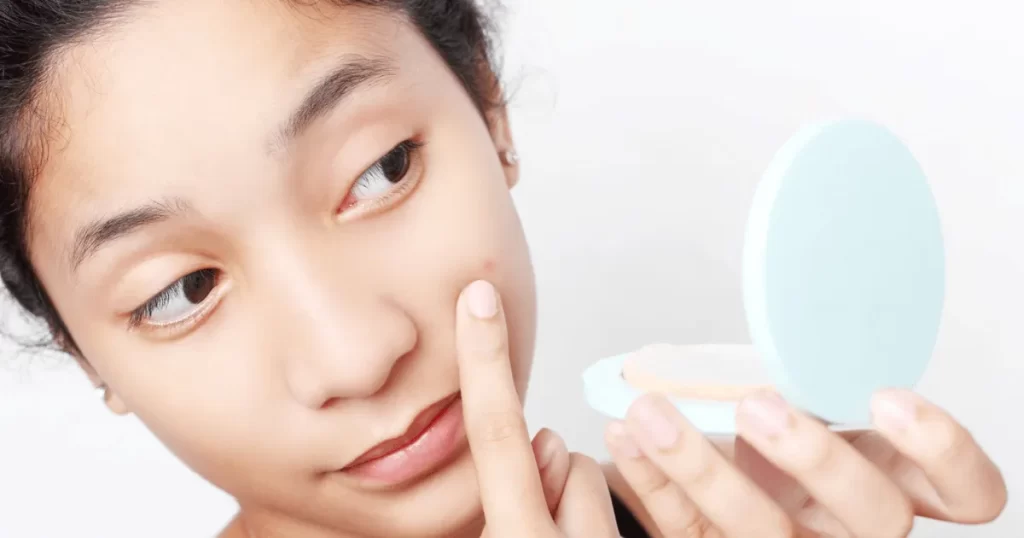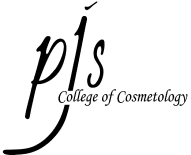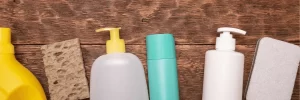March 18, 2021
11 Causes of Acne—How You Can Achieve Clear Skin

Avoid these 11 bad skincare habits to prevent breakouts and gain clear skin.
1) Not Changing Your Bedding
One of the most overlooked causes for bad skin can actually happen while you sleep. People are notorious for forgetting to wash their pillowcases—often for weeks at a time. The average American spends around 30 years of their life in their bed or roughly one-third of their time. With our need for sleep, you can see how a dirty pillowcase (even one that looks visibly clean) can hold a great deal of oil and bacteria. If you are noticing acne or inflamed skin on your cheeks, your dirty pillowcase may be to blame.
Solution: While you should regularly wash your bedding, including your pillowcases, you can also buy pillowcases that are better suited for your skin and hair. Silk pillowcases are a great alternative to fabrics like cotton because they create less friction and absorb less moisture.
2) Ignoring Hormone Imbalances
Hormone imbalances that cause blemishes can be more difficult to pinpoint—it can come on gradually or suddenly. Symptoms can also get clouded by other known conditions or environmental factors. The locations of hormonal acne change as you age. For teenagers, it is often present on the forehead and chin. For adults, it is common among the jawline and lower cheeks and tends to affect women more often. Polycystic ovarian syndrome and other hormonal conditions that cause increased androgen levels have been identified to cause acne.
Solution: If you suspect you have hormonal acne, it is imperative to see a doctor or dermatologist who can help diagnose you and prescribe the necessary medication. It is not recommended to self-treat for hormone imbalances without first consulting a doctor. Besides acne, lethargy, weight gain or loss, thinning or excess hair, and heart rate changes can all be symptoms of a hormonal imbalance.
3) Not Drinking Enough Water
Skin that is dry and dehydrated is not able to maintain a balanced skin barrier. Adults are recommended to drink between 3-4 liters of water a day, depending on their size. Skin that is dehydrated is more prone to breakouts or wrinkles without the balance of moisture. Staying hydrated also ensures that your skin can repair as normal and maintain its elasticity.
Solution: Carrying around a measured water bottle can help remind you to drink enough water throughout the day. If you still struggle to remember to drink the recommended amount, there are hydration apps for smartphones that can send you digital reminders when to drink water and keep track of your daily intake.
4) Using Products That Are Too Strong
Unfortunately, many of the over-the-counter products used to treat acne and blemishes can also cause breakouts. Salicylic acid and benzoyl peroxide are often the main active ingredients in face washes and spot treatments designed to eliminate breakouts. However, the product can be too strong and actually cause irritation-based acne. Additionally, the active ingredient can be the right strength but might be paired with fragrances or other ingredients that are irritating to the skin. Microbeads and certain “scrub” ingredients can also be over-exfoliating and make the skin prone to infection.
Solution: When searching for any skincare ingredients, it is always best to stick with dermatologist-recommended items with more simplified ingredients. Fancy smells and colors may seem appealing, but often the best products are plain in their physical appearance. When selecting active products, start with the smaller dose percentages. You can work your way up once you know the product is not irritating your skin. Always patch test a new product before introducing it into your routine.
5) Not Washing Your Makeup Sponges and Brushes
Anything that regularly touches your face should be as clean as possible. People will spend hundreds of dollars on skincare products but then use makeup sponges and brushes that have accumulated bacteria and dead skin cells. It is important to regularly clean your makeup sponges, brushes, or any other cosmetic tools that regularly touch your face.
Solution: It is recommended to clean your brushes at least once a week or every day for high makeup users like professional makeup artists. Clean your brushes with warm water and a small amount of cleanser in a jar or mug with a swirling motion. Rinse and lay flat to dry. If you’re not sure what to clean with, dish soap can even be used to remove oil and makeup.
5) Eating Too Much Dairy or Processed Foods
Some studies suggest that certain foods can aggravate acne, but there are no absolutes when it comes to each individual’s diet. Dairy products have been the most scrutinized, along with sugary and processed foods. Research has shown that dairy and processed foods can cause acne, but the underlying reasoning and whether this holds true for all people has not yet been demonstrated.
Solution: A healthy and balanced diet will only help your skin maintain its health and vitality. Colorful fruit and vegetables that are rich in vitamins can aid in keeping beautiful skin. Foods like dark leafy greens, sweet potatoes, and carrots loaded in vitamin C, vitamin A, and antioxidants can protect the skin from free radicals and assist collagen production.
6) Not Moisturizing Enough
It is a common misconception that if someone suffers from oily skin, they cannot use a moisturizer because their skin will become oilier. In fact, the opposite is supported—a decent moisturizer can help balance the skin barrier, maintain healthy moisture levels, and reduce some of the oiliness.
Solution: Water-based and lightweight moisturizers can assist in creating a healthy biome for the skin and stop the over-production of oil. Avoid heavy occlusives or oil-based moisturizers if your skin is oily and acne-prone.
7) Forgetting To Exfoliate or Use Actives
If you are struggling with acne or breakouts, most dermatologists will recommend introducing some new products into your skincare routine. The key is to introduce proven actives in a manner that will not irritate the skin and disrupt the desired effect.
Solution: For over-the-counter treatment, salicylic acid, benzoyl peroxide, and sulfur are all used to clear skin, reducing the bacteria that cause acne. However, as these can be irritating, it is better to start with small amounts. It is often recommended to start out with using active products every other day to reduce the likelihood of an irritation breakout.
For those seeking more extensive treatment, a dermatologist can prescribe topical antibiotics, concentrated vitamin A (retinoids), and other products to add to your routine.
8) Using Irritating Hygiene and Cleaning Products
There are a lot of overlooked products that can cause irritation bumps and acne. Laundry detergent, shampoo and conditioner, and even toothpaste have all been known to cause contact dermatitis in some people. If you find you are breaking out throughout your body, along your hairline, or around the mouth, some of your daily hygiene products might be the culprit.
Solution: Stick to natural products that are designed for sensitive skin. Avoid heavy fragrances and strong cleansing ingredients like alcohols or sulfates.
9) Taking Hot Showers
As amazing as a hot shower can feel after a long day, water that is too hot can actually disrupt the skin’s barrier and cause irritation. Hot water can be harsh on your skin and hair—drying out both. The heat also can remove essential oils from your hair and skin. Without these, your skin can dry out and lose its natural protection.
Solution: Stick to using warm water during showers to keep your skin and hair healthy. If you notice any redness or irritation after being in the shower, this likely means that your shower is too hot.
10) Talking With a Dirty Phone Screen
As a society, we can have a near addiction to our phones. Data suggests that people spend up to three to four hours on their phones a day. Knowing this, it is no surprise that our phones can accumulate a lot of dirt and bacteria. If you regularly talk on the phone, that dirt and bacteria can get transferred to your face and cause acne. If you notice a pattern of acne on the side of the cheek, particularly on one side of your face, your phone may be the cause.
Solution: Be sure to disinfect your phone from time to time. You can also use hands-free and speaker settings if you want to keep your devices from directly touching your face.
11) Touching Your Face
The easiest and most affordable way you can clear up your acne is simply to refrain from touching your face. Research suggests that people touch their faces 15-20 times a day. Every time this happens, a person transfers the germs, dirt, and oil from their hands onto the face. Touching and picking at existing acne also can exacerbate the problem, spread acne bacteria, and lead to hyperpigmentation and scarring.
Solution: Refrain from touching your face throughout the day, and do not “pop” existing acne—this can deepen the infection. Face touching is often an unconscious habit, so keeping the hands busy can help prevent you from touching your skin. When you are in relaxed moments, using fidget toys or working on background hobbies like knitting, doodling, or braiding can all prevent you from touching your face.
If you have a love of all things skincare and want to practice your skills professionally, esthetician or cosmetology training might be for you. Esthetician training can lead to helping people with skin conditions and providing some of these skin-saving treatments. Training programs from accredited cosmetology schools can help you learn the skills to set up your own business. For more information, connect with an enrollment advisor online or call 800-62-SALON (72566).


Leave a Reply